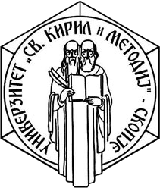Hristina Mihajloska is born in 1985 in Ohrid, Macedonia. She graduated from the Faculty of Natural Science and Mathematics, Department of Informatics in Skopje in 2008. In 2011 got her Master of Science (M.Sc.) degree from the Faculty of Computer Science and Engineering (FINKI) in Skopje, on the TEMPUS program in Software Engineering. Her master thesis is in the field of Symmetric Cryptography, titled “Analysis and construction of optimal S-boxes for block ciphers with quasigroups" supervised by Danilo Gligoroski, a professor at the Norwegian University of Science and Technology (NTNU) in Trondheim, Norway. In March 2017, she got her Doctoral Degree (Ph.D.) from the Faculty of Computer Science and Engineering, with a doctoral dissertation in the field of Cryptography, titled “Lightweight Cryptography from the Theory of Quasigroups Perspective” supervised by prof. Gligoroski.
During her studies, she was continually awarded for her achievements.
After graduating she was employed as a teaching assistant at the Faculty of Natural Science and Mathematics, Department of Informatics in Skopje. Since 2011, she is working as a teaching assistant at the Faculty of Computer Science and Engineering in Skopje. Her work as a teaching assistant includes preparation and teaching of auditory and laboratory exercises for courses such as programming, algorithms and data structures, operating systems, software quality, and testing, cryptography, and information security.
She is participating in a number of international and domestic scientific research projects. As a part of her scientific research activities, she has participated in numerous scientific conferences, workshops, and summer schools. She is an author and co-author of many scientific research papers. She got a number of scientific visits at the Ruhr University in Bochum, Germany, and the Norwegian University of Science and Technology (NTNU) in Trondheim, Norway. She took a part in the world competition for authenticated encryption CAESAR, as one of the authors of the π-Cipher candidate. Currently, her research is focused on authenticated encryption, the design of lightweight ciphers, and provable security in the field of symmetric cryptography.




